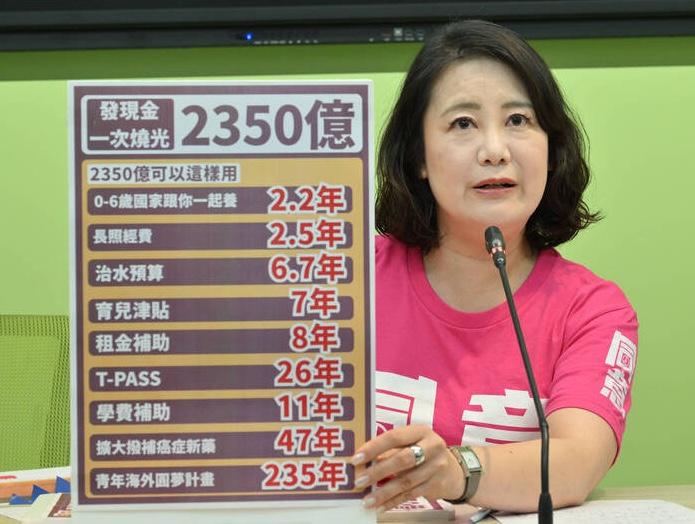The Democratic Progressive Party (DPP) today accused the Chinese Nationalist Party (KMT) of approving NT$10,000 (US$341) cash handouts as a bribe to save itself ahead of the July 26 recall votes.
The legislature on Friday passed the third reading of the government’s special relief package, which includes a NT$235 billion budget for the universal cash handouts proposed by the KMT that increased the total budget from NT$410 billion to NT$545 billion.
Buying votes is “in the KMT’s DNA,” DPP caucus chief executive Rosalia Wu (吳思瑤) told a news conference.

Photo: Tien Yu-hua, Taipei Times
The opposition claims that the national surplus was NT$838.5 billion, but it failed to mention that a large proportion has already been allocated, including NT$380 billion for the post-pandemic recovery plan and NT$150 billion for military upgrades, she said.
After the NT$410 billion Executive Yuan special budget, only NT$33.5 billion remained, she said, questioning where the NT$235 billion for cash handouts would come from.
The KMT is putting the nation in debt and sacrificing Taiwan’s fiscal health, she added.
Previous cash stimulants were approved and budgeted for by the Executive Yuan, Wu said.
For example, in 2009, former president Ma Ying-jeou's (馬英九) administration issued universal consumer vouchers of NT$3,600, while former president Tsai Ing-wen (蔡英文) issued NT$1,000 triple stimulus vouchers in 2020 and quintuple vouchers in 2021, she said.
In 2023, citizens were offered a one-off cash payment of NT$6,000, she added.
However, these latest cash handouts are unconstitutional, as they would unilaterally increase government expenditure, she said.
Wu listed alternative uses for the NT$235 billion, from transport infrastructure to social programs and military uses, including social housing for up to 60,000 families, 26 years of T-Pass funding or 47 years of cancer drug funding.
The Special Act for Strengthening Economic, Social and National Security Resilience in Response to International Circumstances (因應國際情勢強化經濟社會及國土安全韌性特別條例) was proposed in April to counter the effects of US President Donald Trump’s reciprocal tariffs.
The budget entails a NT$150 billion budget for whole-of-society defense resilience and NT$230 billion in cash handouts, although the opposition slashed the proposed NT$100 billion subsidy for Taiwan Power Co (Taipower).
The government must prioritize protecting the nation, and the cash handout is “clearly just vote-buying,” retired major general Chiu Wei-pang (丘衛邦) said today in the legislature.
If the recall votes succeed, the public should not receive the money, he said, questioning whether NT$10,000 is worth sacrificing the future of the country.
Meanwhile, KMT New Taipei City Council caucus secretary-general Wang Wei-yuan (王威元) said that important information regarding the government’s tariff response remains in DPP hands, he said, adding that the party continues to ignore the looming crisis and is instead focusing its energy on the recall votes and political struggles.
The DPP was adamant on keeping the NT$100 billion Taipower subsidy to protect disaster-relief workers, but will not raise wages and improve worker benefits, instead using them as bargaining chips, KMT New Taipei City Council caucus deputy secretary Huang Hsin-hua (黃心華) said.
If the DPP can afford to spend NT$1.62 billion on recall campaigns, “why is it blocking NT$10,000 cash handouts that would benefit the public?” he asked.
Additional reporting by Chen Yu-fu, Lai Hsiao-tung and CNA

The manufacture of the remaining 28 M1A2T Abrams tanks Taiwan purchased from the US has recently been completed, and they are expected to be delivered within the next one to two months, a source said yesterday. The Ministry of National Defense is arranging cargo ships to transport the tanks to Taiwan as soon as possible, said the source, who is familiar with the matter. The estimated arrival time ranges from late this month to early next month, the source said. The 28 Abrams tanks make up the third and final batch of a total of 108 tanks, valued at about NT$40.5 billion

Two Taiwanese prosecutors were questioned by Chinese security personnel at their hotel during a trip to China’s Henan Province this month, the Mainland Affairs Council (MAC) said yesterday. The officers had personal information on the prosecutors, including “when they were assigned to their posts, their work locations and job titles,” MAC Deputy Minister and spokesman Liang Wen-chieh (梁文傑) said. On top of asking about their agencies and positions, the officers also questioned the prosecutors about the Cross-Strait Joint Crime-Fighting and Judicial Mutual Assistance Agreement, a pact that serves as the framework for Taiwan-China cooperation on combating crime and providing judicial assistance, Liang

A group from the Taiwanese Designers in Australia association yesterday represented Taiwan at the Midsumma Pride March in Melbourne. The march, held in the St. Kilda suburb, is the city’s largest LGBTQIA+ parade and the flagship event of the annual Midsumma Festival. It attracted more than 45,000 spectators who supported the 400 groups and 10,000 marchers that participated this year, the association said. Taiwanese Designers said they organized a team to march for Taiwan this year, joining politicians, government agencies, professionals and community organizations in showing support for LGBTQIA+ people and diverse communities. As the first country in Asia to legalize same-sex

MOTIVES QUESTIONED The PLA considers Xi’s policies toward Taiwan to be driven by personal considerations rather than military assessment, the Epoch Times reports Chinese President Xi Jinping’s (習近平) latest purge of the Chinese People’s Liberation Army (PLA) leadership might have been prompted by the military’s opposition to plans of invading Taiwan, the Epoch Times said. The Chinese military opposes waging war against Taiwan by a large consensus, putting it at odds with Xi’s vision, the Falun Gong-affiliated daily said in a report on Thursday, citing anonymous sources with insight into the PLA’s inner workings. The opposition is not the opinion of a few generals, but a widely shared view among the PLA cadre, the Epoch Times cited them as saying. “Chinese forces know full well that